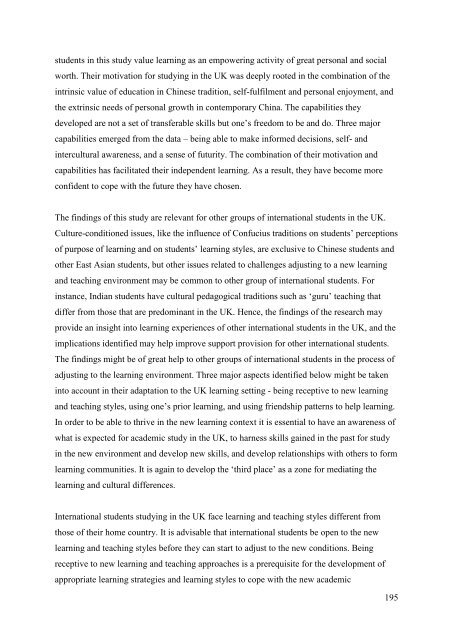The challenge of academic writing for Chinese students within ...
The challenge of academic writing for Chinese students within ...
The challenge of academic writing for Chinese students within ...
Create successful ePaper yourself
Turn your PDF publications into a flip-book with our unique Google optimized e-Paper software.
<strong>students</strong> in this study value learning as an empowering activity <strong>of</strong> great personal and social<br />
worth. <strong>The</strong>ir motivation <strong>for</strong> studying in the UK was deeply rooted in the combination <strong>of</strong> the<br />
intrinsic value <strong>of</strong> education in <strong>Chinese</strong> tradition, self-fulfilment and personal enjoyment, and<br />
the extrinsic needs <strong>of</strong> personal growth in contemporary China. <strong>The</strong> capabilities they<br />
developed are not a set <strong>of</strong> transferable skills but one‘s freedom to be and do. Three major<br />
capabilities emerged from the data – being able to make in<strong>for</strong>med decisions, self- and<br />
intercultural awareness, and a sense <strong>of</strong> futurity. <strong>The</strong> combination <strong>of</strong> their motivation and<br />
capabilities has facilitated their independent learning. As a result, they have become more<br />
confident to cope with the future they have chosen.<br />
<strong>The</strong> findings <strong>of</strong> this study are relevant <strong>for</strong> other groups <strong>of</strong> international <strong>students</strong> in the UK.<br />
Culture-conditioned issues, like the influence <strong>of</strong> Confucius traditions on <strong>students</strong>‘ perceptions<br />
<strong>of</strong> purpose <strong>of</strong> learning and on <strong>students</strong>‘ learning styles, are exclusive to <strong>Chinese</strong> <strong>students</strong> and<br />
other East Asian <strong>students</strong>, but other issues related to <strong>challenge</strong>s adjusting to a new learning<br />
and teaching environment may be common to other group <strong>of</strong> international <strong>students</strong>. For<br />
instance, Indian <strong>students</strong> have cultural pedagogical traditions such as ‗guru‘ teaching that<br />
differ from those that are predominant in the UK. Hence, the findings <strong>of</strong> the research may<br />
provide an insight into learning experiences <strong>of</strong> other international <strong>students</strong> in the UK, and the<br />
implications identified may help improve support provision <strong>for</strong> other international <strong>students</strong>.<br />
<strong>The</strong> findings might be <strong>of</strong> great help to other groups <strong>of</strong> international <strong>students</strong> in the process <strong>of</strong><br />
adjusting to the learning environment. Three major aspects identified below might be taken<br />
into account in their adaptation to the UK learning setting - being receptive to new learning<br />
and teaching styles, using one‘s prior learning, and using friendship patterns to help learning.<br />
In order to be able to thrive in the new learning context it is essential to have an awareness <strong>of</strong><br />
what is expected <strong>for</strong> <strong>academic</strong> study in the UK, to harness skills gained in the past <strong>for</strong> study<br />
in the new environment and develop new skills, and develop relationships with others to <strong>for</strong>m<br />
learning communities. It is again to develop the ‗third place‘ as a zone <strong>for</strong> mediating the<br />
learning and cultural differences.<br />
International <strong>students</strong> studying in the UK face learning and teaching styles different from<br />
those <strong>of</strong> their home country. It is advisable that international <strong>students</strong> be open to the new<br />
learning and teaching styles be<strong>for</strong>e they can start to adjust to the new conditions. Being<br />
receptive to new learning and teaching approaches is a prerequisite <strong>for</strong> the development <strong>of</strong><br />
appropriate learning strategies and learning styles to cope with the new <strong>academic</strong><br />
195


